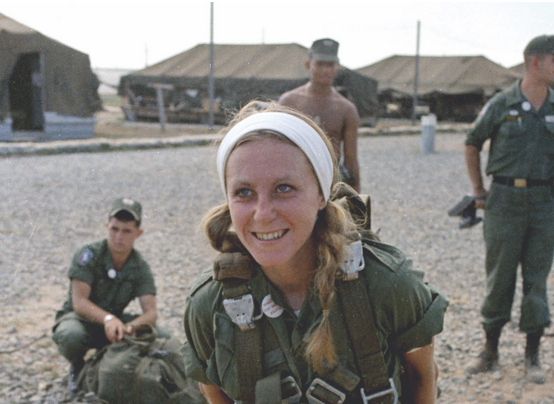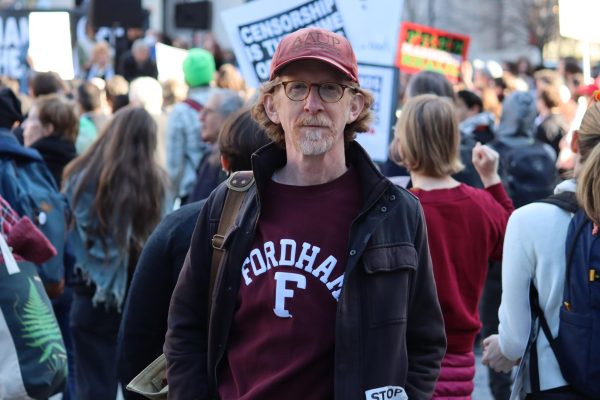Fordham Awards Annual Sperber Prize Ceremony

Becker’s book follows the story of three female journalists who independently covered the Vietnam War. (Courtesy of Twitter)
On Nov. 7, Fordham hosted the Sperber Prize Ceremony at the Lincoln Center campus. At the ceremony, the award was given to journalist Elizabeth Becker for her book “You Don’t Belong Here: How Three Women Rewrote the Story of War.”
The annual Sperber Prize honors journalistic biographies and memoirs. The prize was named after Ann M. Sperber, who wrote a biography about journalist Edward R. Murrow called “Murrow: His Life and Times,” and was published by Fordham University Press. It received many awards and was considered as a finalist for the 1987 Pulitzer Prize.
“It’s wonderful,” said Becker. “It’s a singular award, and it’s specifically about the kind of book I wrote. To be chosen as the best of the year is a lifetime honor. There’s nothing else. The book means a lot to me, therefore the award is even more impressive.”
Earlier this year, Becker also won Harvard’s Goldsmith Book Prize.
Becker’s book follows the story of three female journalists who independently covered the Vietnam War: Australian reporter Kate Webb, French photographer Catherine Leroy and American journalist Frances FitzGerald.
According to Becker, these women did not know each other and worked separately, making it difficult to tell all their stories simultaneously.
“[The three women] were not a group. They operated totally independently, yet they managed to break the ultimate glass ceiling. Nobody had told that story,” said Becker. “So it was a tough one. One, I had to prove they did the glass ceiling, and two, that it mattered.”
“You Don’t Belong Here” explains the work of these women within the context of the Vietnam War. According to Becker, that makes the work of these women especially trailblazing. They did not solely report on the war. “[They] didn’t just cover the war on the battlefield, they covered the country at war, and that means they looked at the people, the culture, the history of Vietnam and gave dimension to the war. Quite frankly, from very early on, [they] showed why the United States had made a tragic, fatal mistake in fighting that war and why they would lose. This is the first and only war that the United States completely lost. That’s a big hard thing to do,” said Becker.
Becker covered the end of the Vietnam War, and she said that this personal connection to working as a reporter in that period as a woman, made writing the book much more impactful.
“I couldn’t have written it if it hadn’t been personal, because I lived what they lived. [It is] the ultimate leg up, I knew by living it there was a story here,” said Becker. “And of course, it made it more impactful because I was able to tell the story after all those years. Covering a war, no matter what it is, normally you’re 100% witness but to then pull the curtain back and see how you’re also a part of the history was daunting.”
In addition to Becker, the ceremony also honored Marvin Kalb, a former CBS reporter, educator and memoir author. He was given a certificate for career achievement.
“Assignment Russia: Becoming a Foreign Correspondent in the Crucible of the Cold War,” Kalb’s second memoir, was a finalist for this year’s Sperber Prize, and his first memoir “The Year I Was Peter the Great” was a finalist in 2018. Both books are about Kalb’s time reporting on Nikita Khruschez’s Russia.
Kalb said that he is honored to be recognized at the Sperber Prize and to be associated with Becker but also noted his personal connection to Murrow, who hired Kalb at CBS as a reporter.
“Murrow was an internally important person in my professional life. I have read, I think, every book about Murrow, and there have been quite a few, but I think the Sperber Book is by far, in a way, the best. And I am grateful to the people at Sperber who would think enough of my work to offer this official recognition, and I thank them very much,” said Kalb.
The memoirs cover Kalb’s work in Russia from the mid-1950s to the early-1960s. Kalb has written books about Russia, Vietnam, China and the Middle East, but “The Year I Was Peter the Great” was his first memoir. According to Kalb, he was influenced by his family to write a memoir because the story of being a journalist in Khrushchev’s Russia is compelling to many.
“And the story of Khrushchev’s Russia from the mid-1950s to the time I left in the early 1960s was a particularly compelling story, and I think the story itself said a great deal about what we were like during the Cold War when there was [a threat] of nuclear war and what was the responsibility of a reporter,” said Kalb.
Coming from a career as a journalist, Kalb said it was a difficult transition to memoir writing.
“It’s difficult because when you write about yourself and you are a journalist, how do you write objectively about yourself?” said Kalb. “I can tell you it’s difficult, but it is doable. If you think of yourself as simply a part of the story, in the same way other people are parts of a story, and you keep your emotions out of it, I think it’s doable.”

Isabel Danzis is a senior from Bethesda, Md. She is double majoring in journalism and digital technologies and emerging media. The Ram has been a very...










































































































































































































